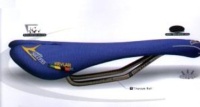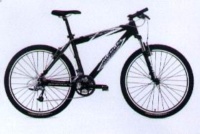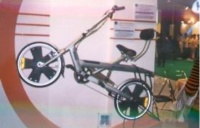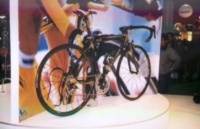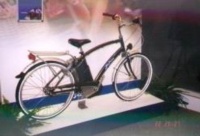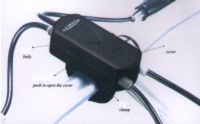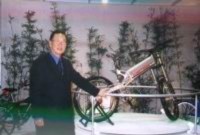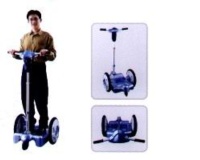Taipei Cycle Show Rides Off Into Another Sunset
Apr 14, 2003 Ι Industry In-Focus Ι General Items Ι By Quincy, CENS
Although the SARS scare unfolding internationally cut by 23% the number of buyers to the 2003 Taipei International Cycle Show (Taipei Cycle '03), held at the Taipei World Trade Center (TWTC) Mar. 29~Apr. 1, the rich content of the exhibition gave strong indications of which way the global bicycle industry will go in the future.
The organizers, the China External Trade Development Council (CETRA) and the Taiwan Bicycle Exporters' Association (TBEA), reported that the show attracted 601 exhibitors from all over the world. They manned 1,751 booths that were visited by a total of 2,110 registered buyers (down from 2,736 last year), half of them from Asia.
The number of visitors from Europe suffered a particularly precipitous decline because of the war in Iraq and the SARS scare. The top three source countries were Japan (accounting for l7% of the total), the United States (15%), and South Korea (7%).
A TBEA official says that most exhibitors were pleased with the results of the show despite the diminished attendance. A senior official of Giant Manufacturing Co., the island's largest bicycle maker, says that cancellations by foreign buyers would only delay the placing of orders.
One industry trend clearly manifested during the show was the "three news": new materials, new functions, and new applications. Many of the exhibitors expect that their new products will put them at the head of new fashion trends or even set new industry standards for the next few years.
According to CETRA, this reflects the general upgrading of Taiwan's bicycle industry to the upper end of the market. This is borne out by TBEA statistics, which show that while both the value and volume of exports of Taiwan-made bicycles declined last year, to US$523 million (down 2.3%) and 4.22 million units (down 12.03%), respectively, the unit export price reached a record high of US$124.16.
The TBEA also reports that Europe has replaced the U.S. as the largest export market for Taiwan's bicycles, taking 1.69 million units last year, up 5.27%. The U.S. bought 1.08 million units, down 16.81%. Shipments to Japan dropped 30% in 2002, to just 750,000 units.
The range of bicycle types exported has also seen major changes. Last year the island shipped out 164,000 folding bikes, down 42.84%, while exports of electric bicycles topped 42,000, soaring 120% over the previous year. The U.S. alone absorbed 37,000 of the electric models.
Ike Tseng, chairman of both the TBEA and the island's second-largest bicycle maker, Merida Industry Co., notes that more and more of Taiwan's bicycle manufacturers are transforming their local factories into supply centers and R&D headquarters for the development of higher-end products.
Merida itself is an example of this trend. During Taipei Cycle it exhibited a series of top-end models with magnesium-alloy frames; the company claims that it is the first in the world to develop frames of this material, which feature light weight, excellent shock absorption, and high strength--but require highly sophisticated manufacturing techniques. The company also uses the advanced liquid-press forming technique, with several models sporting the three-dimensional symbols indicating use of the technique on their frames.
Taking Giant Strides
Giant, too, is constantly striving to develop newer and better products that offer better profit margins. Among the new models it had on show this year were the Revive comfort bike, TCR composite road bike, and E612 electric lady's bike.
The special ergonomic design of the Revive's frame can greatly relieve pressure on the rider's posterior, shoulders, and back. The bike uses lumbar support to encourage an upright posture, which promotes healthy spine alignment, and a low instep enables the rider to remain flat-footed while seated for increased stability and safety. An adjustable seat-post/handlebar design accommodates riders 150 cm to 205 cm in height.
Giant has used its expertise in composite production to produce a frame that is light and strong, and that offers excellent performance, according to the company. Increased lateral rigidity improves power transmission and handling, while the curved seat-stay design dampens vibrations and reduces rider fatigue. The TCR composite model was, in fact, ridden to victory in the 2002 Tour de France by the Spanish ONCE team.
The company's new E612 electric lady's bike uses a power-assisted pedaling (PAP) system, moving it a step closer to becoming a daily transportation vehicle. This high-end model also features a portable battery pack, a four-speed hub from Shimano, and a highly efficient power-control unit.
Downhill Means Uphill Technologically
Another exhibitor at Taipei Cycle '03, Fairly Bike Manufacturing Co., has been busy developing its high-margin original equipment design/manufacturing (OEM/ODM) business by investing heavily in new-product development.
Fairly's display at the show featured a prototype of what it claims is the world's first electric downhill bike. The company's chairman, Masao Chien, says that this innovative model uses the help of a power unit to allow riders to overcome downhill challenges.
The new bike offers a choice of full electric power or pure pedaling force (instead of power assisted pedaling) and employs a lithium-ion battery (24 volts, with 36 volts on the way), an aluminum-alloy frame, and a 500V motor (with a 1,000V model on the way) made by Heinzmann of Germany.
Fairly concentrates exclusively on the supply of high-end pedal bicycles and electric bikes, with a manufacturing and development capability, Chien says, that is widely recognized internationally.
Fairly exported about 90,000 bikes last year, 80% of them for the upper end of the market, with an average unit price of US$370. The shipments went to Marine, REI, and Kona of the U.S., Stevens of Europe, and other distributors. Fairly is Taiwan's biggest exporter of electric bikes, shipping about 30,000 units to such big brands as EVG of the U.S. last year.
The company is now working hard to develop its electric-bike manufacturing and sales in mainland China, where its models are marketed under the company's own Zokes brand. Chien claims that although these bikes are priced 30% to 40% higher than others in the market there, they are still competitive because of their high quality.
Moving Humans
Visitors to Taipei Cycle '03 also saw a Taiwan-developed competitor to the industry-standard Segway Human Transporter. Liu Bao-bao, president of the Taiwan Bicycle Industry R&D Center (TBIRC), reports that this new model, dubbed the Free-Go, was developed by his organization and is much cheaper than the American model though it possesses similar functions.
If the Free-Go is commercialized, Liu says, it will be priced at about US$700--around a quarter the price of the Segway. It uses mostly aluminum-alloy parts and weighs only about 23 kilograms; it has a top speed of 20 kilometers per hour, is equipped with an electronic differential, and has a 36V, 180W brushless motor.
The TBIRC also displayed new alloy frames, electric scooters, and production-management systems for the bicycle industry. Most of its R&D achievements will be transferred to the private sector for commercialization.
Others in the Lead Pack
Falcon Cycle Parts Co., a leading Taiwan maker of bike parts, demonstrated an innovative anti-lock braking system (ABS) for bicycles. This system, the company claims, can automatically balance braking force between front and rear wheels, synchronize front and rear braking performance, prevent both brakes from locking (and tipping the bicycle over), greatly shorten braking distance, and prolong the life of brake shoes.
Selle Success Enterprise Co. showed off a series of top-end racing saddles with titanium or graphite frames and high-end components such as Dupont's ultra-light Kevlar cloth, carbon-fiber composite shells, and flex-control padding. The saddles weigh only about 170 grams each.
SunRace Sturmey-Archer Inc. unveiled its S50 inter-gear hub, featuring five speeds, a gear ratio of 225%, a transmission efficiency of over 95%, and a weight, including the brake, of only 2.2 kg. The company touts this product as a complete transmission system that combines the functions of transmission, gear shifting, and braking.
The organizers, the China External Trade Development Council (CETRA) and the Taiwan Bicycle Exporters' Association (TBEA), reported that the show attracted 601 exhibitors from all over the world. They manned 1,751 booths that were visited by a total of 2,110 registered buyers (down from 2,736 last year), half of them from Asia.
The number of visitors from Europe suffered a particularly precipitous decline because of the war in Iraq and the SARS scare. The top three source countries were Japan (accounting for l7% of the total), the United States (15%), and South Korea (7%).
A TBEA official says that most exhibitors were pleased with the results of the show despite the diminished attendance. A senior official of Giant Manufacturing Co., the island's largest bicycle maker, says that cancellations by foreign buyers would only delay the placing of orders.
One industry trend clearly manifested during the show was the "three news": new materials, new functions, and new applications. Many of the exhibitors expect that their new products will put them at the head of new fashion trends or even set new industry standards for the next few years.
According to CETRA, this reflects the general upgrading of Taiwan's bicycle industry to the upper end of the market. This is borne out by TBEA statistics, which show that while both the value and volume of exports of Taiwan-made bicycles declined last year, to US$523 million (down 2.3%) and 4.22 million units (down 12.03%), respectively, the unit export price reached a record high of US$124.16.
The TBEA also reports that Europe has replaced the U.S. as the largest export market for Taiwan's bicycles, taking 1.69 million units last year, up 5.27%. The U.S. bought 1.08 million units, down 16.81%. Shipments to Japan dropped 30% in 2002, to just 750,000 units.
The range of bicycle types exported has also seen major changes. Last year the island shipped out 164,000 folding bikes, down 42.84%, while exports of electric bicycles topped 42,000, soaring 120% over the previous year. The U.S. alone absorbed 37,000 of the electric models.
Ike Tseng, chairman of both the TBEA and the island's second-largest bicycle maker, Merida Industry Co., notes that more and more of Taiwan's bicycle manufacturers are transforming their local factories into supply centers and R&D headquarters for the development of higher-end products.
Merida itself is an example of this trend. During Taipei Cycle it exhibited a series of top-end models with magnesium-alloy frames; the company claims that it is the first in the world to develop frames of this material, which feature light weight, excellent shock absorption, and high strength--but require highly sophisticated manufacturing techniques. The company also uses the advanced liquid-press forming technique, with several models sporting the three-dimensional symbols indicating use of the technique on their frames.
Taking Giant Strides
Giant, too, is constantly striving to develop newer and better products that offer better profit margins. Among the new models it had on show this year were the Revive comfort bike, TCR composite road bike, and E612 electric lady's bike.
The special ergonomic design of the Revive's frame can greatly relieve pressure on the rider's posterior, shoulders, and back. The bike uses lumbar support to encourage an upright posture, which promotes healthy spine alignment, and a low instep enables the rider to remain flat-footed while seated for increased stability and safety. An adjustable seat-post/handlebar design accommodates riders 150 cm to 205 cm in height.
Giant has used its expertise in composite production to produce a frame that is light and strong, and that offers excellent performance, according to the company. Increased lateral rigidity improves power transmission and handling, while the curved seat-stay design dampens vibrations and reduces rider fatigue. The TCR composite model was, in fact, ridden to victory in the 2002 Tour de France by the Spanish ONCE team.
The company's new E612 electric lady's bike uses a power-assisted pedaling (PAP) system, moving it a step closer to becoming a daily transportation vehicle. This high-end model also features a portable battery pack, a four-speed hub from Shimano, and a highly efficient power-control unit.
Downhill Means Uphill Technologically
Another exhibitor at Taipei Cycle '03, Fairly Bike Manufacturing Co., has been busy developing its high-margin original equipment design/manufacturing (OEM/ODM) business by investing heavily in new-product development.
Fairly's display at the show featured a prototype of what it claims is the world's first electric downhill bike. The company's chairman, Masao Chien, says that this innovative model uses the help of a power unit to allow riders to overcome downhill challenges.
The new bike offers a choice of full electric power or pure pedaling force (instead of power assisted pedaling) and employs a lithium-ion battery (24 volts, with 36 volts on the way), an aluminum-alloy frame, and a 500V motor (with a 1,000V model on the way) made by Heinzmann of Germany.
Fairly concentrates exclusively on the supply of high-end pedal bicycles and electric bikes, with a manufacturing and development capability, Chien says, that is widely recognized internationally.
Fairly exported about 90,000 bikes last year, 80% of them for the upper end of the market, with an average unit price of US$370. The shipments went to Marine, REI, and Kona of the U.S., Stevens of Europe, and other distributors. Fairly is Taiwan's biggest exporter of electric bikes, shipping about 30,000 units to such big brands as EVG of the U.S. last year.
The company is now working hard to develop its electric-bike manufacturing and sales in mainland China, where its models are marketed under the company's own Zokes brand. Chien claims that although these bikes are priced 30% to 40% higher than others in the market there, they are still competitive because of their high quality.
Moving Humans
Visitors to Taipei Cycle '03 also saw a Taiwan-developed competitor to the industry-standard Segway Human Transporter. Liu Bao-bao, president of the Taiwan Bicycle Industry R&D Center (TBIRC), reports that this new model, dubbed the Free-Go, was developed by his organization and is much cheaper than the American model though it possesses similar functions.
If the Free-Go is commercialized, Liu says, it will be priced at about US$700--around a quarter the price of the Segway. It uses mostly aluminum-alloy parts and weighs only about 23 kilograms; it has a top speed of 20 kilometers per hour, is equipped with an electronic differential, and has a 36V, 180W brushless motor.
The TBIRC also displayed new alloy frames, electric scooters, and production-management systems for the bicycle industry. Most of its R&D achievements will be transferred to the private sector for commercialization.
Others in the Lead Pack
Falcon Cycle Parts Co., a leading Taiwan maker of bike parts, demonstrated an innovative anti-lock braking system (ABS) for bicycles. This system, the company claims, can automatically balance braking force between front and rear wheels, synchronize front and rear braking performance, prevent both brakes from locking (and tipping the bicycle over), greatly shorten braking distance, and prolong the life of brake shoes.
Selle Success Enterprise Co. showed off a series of top-end racing saddles with titanium or graphite frames and high-end components such as Dupont's ultra-light Kevlar cloth, carbon-fiber composite shells, and flex-control padding. The saddles weigh only about 170 grams each.
SunRace Sturmey-Archer Inc. unveiled its S50 inter-gear hub, featuring five speeds, a gear ratio of 225%, a transmission efficiency of over 95%, and a weight, including the brake, of only 2.2 kg. The company touts this product as a complete transmission system that combines the functions of transmission, gear shifting, and braking.
©1995-2006 Copyright China Economic News Service All Rights Reserved.






